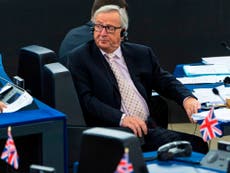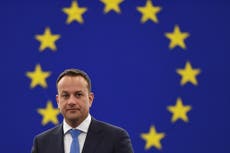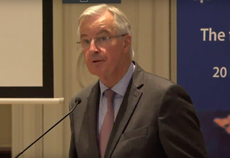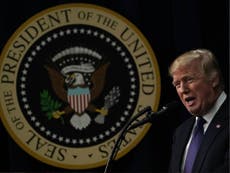European leaders have started wooing Britain because they sense a change of heart over Brexit
Jean-Claude Juncker has started sending us Cupid arrows of love, asking us to consider that Brexit would be a 'lose-lose situation'
Maybe back in 1066 what was bad for this country (well, most of the “English” bit, and specifically Harold Godwinson) was good for Europe (well, the Normandy bit, and its Duke, William), but nowadays there is a more enlightened understanding of the relationship.
It was summed up by the much-maligned Jean-Claude Juncker. Shooting Cupid arrows of love this time round, the President of the European Commission says that Brexit will be a "lose-lose situation" for Britain and the EU, and a "catastrophe" for all concerned.
Such warm words come close after those of Donald Tusk, who seems never far from tears whenever he has to talk about his “British friends” leaving the European club.
He – once again – stressed that Britain would be very welcome to stay if it wants to change its mind. Some months ago similar sentiments were expressed by President Macron of France, and repeated by his spokeswoman now, and by the then German finance minister, Wolfgang Schäuble, shortly to become Speaker of the Bundestag. Meantime the Irish PM, Leo Varadkar took the opportunity to remind the British of the most logically intractable Brexit issue of all – the Irish border, and the huge barrier that represents to a happy, practical Brexit. They speak for many in the 27.
If Britain, post-Brexit was to execute the biggest U-turn since the Russians dumped Communism how would we get back in? Plenty of speculation, but you may as well read the full text of Article 49 of the EU Lisbon Treaty (2009) which sets it all down quite simply:
“Any European State which respects the values referred to in Article 2 and is committed to promoting them may apply to become a member of the Union. The European Parliament and national Parliaments shall be notified of this application. The applicant State shall address its application to the Council, which shall act unanimously after consulting the Commission and after receiving the assent of the European Parliament, which shall act by an absolute majority of its component members.
The conditions of admission and the adjustments to the Treaties on which the Union is founded, which such admission entails, shall be the subject of an agreement between the Member States and the applicant State. This agreement shall be submitted for ratification by all the contracting States in accordance with their respective constitutional requirements. The conditions of eligibility agreed upon by the European Council shall be taken into account.”
So if the various European governments and parliaments are happy with idea – no easy assumption – then the terms of what we might call “Reverse Brexit” or “Rejexit” or some other portmanteau, are up for grabs. David Davis and Michel Barnier could start all over again, but in reverse. Imagine!
So the European door remains open to Britain either before or after Brexit ever happens. It would be odd indeed if the British, having been through the living hell of the Brexit process, the UK decided to drop the whole thing or, indeed to leave only to shortly re-apply for membership. It would be a sort of diplomatic hokey-cokey.
It was always said the British couldn't make their minds up about Europe – but having applied to join twice and refused in the 1960s, managed to get in in the 1970s, been lecturing, truculent members through the 1980s to the 2010s, then deciding to leave, narrowly, but then asking to come back – well that does sound a bit ridiculous.
Yet it is the reality the British mindset; either in or out, it is always half-hearted, and so the possibility of a change of heart is actually always the most probable outcome, and Europe is an issue that will never be “settled”. It has been by turns wildly popular and despised and, variously, vital or trivial in public opinion polling over six decades now.
There is a long track record of British messy thinking on Europe: the Referendum’s 48/52 split should have come as no surprise taking along view, and could easily have been the other way. It wasn’t “decisive” in any sense.
Across the Channel they have acute political antennae, and understand the Janus-faced British better than we might assume. They can see the way the wind is blowing across the British political landscape right now – the 2017 election showed that hard Brexit isn’t so very popular, and the polling confirms growing doubts. For step by tiny step the British electorate and its leaders are edging towards the notion of a so-called second referendum on Brexit, if only to help unify the nation and bind up its wounds.
After all, if Nigel Farage can contemplate such a move, and Jeremy Corbyn never seems quite ready to rule it out, then why shouldn’t our European friends and neighbours indulge themselves a little, and encourage that potential change of heart?
Of course it is not likely, but then again the idea of Brexit was thought to be confined to lunatic fringe, and, ahem, the British have witnessed more than their share of political upsets in recent years. Already parliament is asserting its right to hold a decisive vote on the terms of the Brexit deal, and, given the precedent of the referendums of 1975 and 2016, there is a compelling case for a final say on the deal to rest with the British people, and in such time as to allow the option of remaining within the European Union.
One last thought, in this game of poker. For the British it is perfectly true, as Mr Juncker argues, for Britain to re-apply for membership. We’d be welcome, no doubt about that. But on what terms? No rebate on the EU Budget? A commitment to join the euro single currency? Acceptance of closer integration of foreign policy and defence? A European Army?
We run the risk, we may as well admit it, of leaving, finding life extremely uncomfortable outside the EU, then tentatively explore the possibility of re-joining a EU, but having to swallow even worse terms than Ted Heath managed to get back in 1972, or indeed David Cameron managed a couple of years ago during is modest “renegotiations”.
While this is no zero sum game, and both sides can therefore lose, it is perfectly plausible that the UK will lose more than the EU. How long will we wish to put up with that?







Join our commenting forum
Join thought-provoking conversations, follow other Independent readers and see their replies